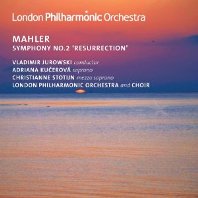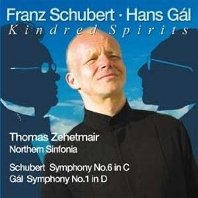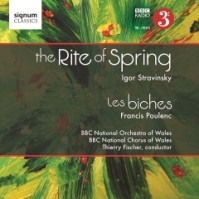Classical CDs Weekly: Mahler, Schubert, Stravinsky | reviews, news & interviews
Classical CDs Weekly: Mahler, Schubert, Stravinsky
Classical CDs Weekly: Mahler, Schubert, Stravinsky
With Gál and Poulenc thrown in: this week it's all about kindred spirits
A 20th-century Austrian symphony receives a memorable first recording, coupled with a witty, rarely played slice of Schubert. Mahler’s Resurrection Symphony is heard in a powerful reading recorded in the Royal Festival Hall. And we’ve an intelligent, logical coupling of two ballets commissioned by Diaghilev.
 Mahler: Symphony No 2 Resurrection LPO and Choir/ Jurowski, with Adriana Kučerova (soprano) and Christianne Stotijn (mezzo soprano) (LPO)
Mahler: Symphony No 2 Resurrection LPO and Choir/ Jurowski, with Adriana Kučerova (soprano) and Christianne Stotijn (mezzo soprano) (LPO)
The LPO’s own label have already released a staggering performance of this work under the late Klaus Tennstedt, so you do wonder nervously how this 2009 newcomer will measure up. Mahler’s more extravagant symphonies thrive in concert halls – so many studio recordings fall flat when compared with live recordings, despite their inevitable imperfections and fluffs.
With Jurowski’s account, taped in the Royal Festival Hall, the playing is more secure and the outlook more modern, highlighting the shocks and the shrieks. His Allegro maestoso opening is fierce, fast and unyielding. It’s very exciting, if lacking the sense of deathly struggle heard in Tennstedt’s reading. Jurowski’s Andante moderato feels a little too chilly – stately, elegant but ultimately uninvolving. Much better is the Scherzo, where Mahler’s sardonic humour is given rightful prominence – delicious string slides, woodwind squeaks and an atmospheric account of the trio section, a glorious hazy mixture of harps, blurry strings and soft trumpets. The movement’s dissonant climax is an Expressionist shocker. We’ve tipped over the abyss and the closing pages are pitch black.
Christianne Stotijn’s tender Urlicht steals in immediately. Jurowski’s finale grips from the outset; offstage brass are perfectly caught, and I like the flowing tempo he adopts when building up to the massive, ecstatic eruption 13 minutes in. I wasn’t distracted by thoughts of Coates’s Dambusters march in the central section, and the LPO choir are magnificent when they make their soft entry. Unless this rambling last movement can be made to sound coherent, the whole symphony can fall apart. Jurowski knits the diverse threads together in style.
 Schubert: Symphony No 6/ Hans Gál: Symphony No 1 Northern Sinfonia/ Thomas Zehetmair (Avie)
Schubert: Symphony No 6/ Hans Gál: Symphony No 1 Northern Sinfonia/ Thomas Zehetmair (Avie)
This release is subtitled Kindred Spirits and features one of Schubert’s lesser-known symphonies coupled with the first recording of Hans Gál’s Symphony No 1. Both works sound recognisably Viennese – Schubert’s Sixth was completed in 1818, Gál’s over a century later in 1927. Of Jewish decent, Gál left Vienna for good in the 1930s, arriving in Britain. Interned for several months in 1940 as an "enemy alien", he eventually settled in Edinburgh where he remained until his death in 1987. He wrote books about Brahms, Schubert and Wagner and continued to compose throughout his long life. Gál’s symphony is a find – it’s deft, witty and marvellously, lucidly orchestrated, the lightness of touch ensuring that Gál’s occasionally thick chromatics never sound too oppressively fin-de-siècle. At times it’s like listening to down-sized Mahler. The slow Elegy is the highlight, the opening oboe solo leading to an indecently passionate, erotic climax.
Schubert’s Sixth, his "Little C Major", offers all the pleasures of his Ninth Symphony, in about half the time. We’ve all the familiar Schubertian tics – quirky modulations, unexpected mood changes, and glorious, singing woodwind writing – sections of the outer movements sound like offcuts from Rossini overtures. Thomas Zehetmair’s reading accentuates the occasional touches of drama – listen to the furious outburst just before the first movement’s coda. But it’s beautifully articulated and full of fun. Playing and recording are faultless.
 Stravinsky: The Rite of Spring/ Poulenc: Les biches BBC National Orchestra of Wales, BBC National Chorus of Wales/ Thierry Fischer (Signum)
Stravinsky: The Rite of Spring/ Poulenc: Les biches BBC National Orchestra of Wales, BBC National Chorus of Wales/ Thierry Fischer (Signum)
The world doesn’t exactly need another recording of Stravinsky’s Rite, but this live performance from an unexpected source is very, very decent. Thierry Fischer’s augmented orchestra avoids sounding slick, and you can really sense just how strange and shocking this warhorse must have sounded in 1913. There’s so much to enjoy in the sheer sound of this performance – the gorgeous, Impressionistic textures conjured up in the slow opening to the ballet’s second half, or the swift traipse through "The Augurs of Spring", with the offbeat chords sonorous and weighty. And the "Dance of the Earth" is terrific, from the bass drum rumble which starts proceedings to the whooping, barking horns. You can almost feel the delight on the players’ faces at finishing without mishap.
But you should buy this for the generous, unusual coupling with Francis Poulenc’s rowdy, witty 1924 ballet Les biches. Another Diaghilev commission, it’s an early work, less emotionally involving than much of Poulenc’s mature music. There’s not a lot to dislike though, and good to hear the complete ballet score with the three choral numbers included – the central "Jeu" is one of the most entertaining things you’ll hear all year. I’d forgotten how much Stravinsky there is in Poulenc – we’re not a million miles from Pulcinella here. As with the Rite, the performance is immaculate.
Explore topics
Share this article
more Classical music
 Ridout, Włoszczowska, Crawford, Lai, Posner, Wigmore Hall review - electrifying teamwork
High-voltage Mozart and Schoenberg, blended Brahms, in a fascinating programme
Ridout, Włoszczowska, Crawford, Lai, Posner, Wigmore Hall review - electrifying teamwork
High-voltage Mozart and Schoenberg, blended Brahms, in a fascinating programme
 Sabine Devieilhe, Mathieu Pordoy, Wigmore Hall review - enchantment in Mozart and Strauss
Leading French soprano shines beyond diva excess
Sabine Devieilhe, Mathieu Pordoy, Wigmore Hall review - enchantment in Mozart and Strauss
Leading French soprano shines beyond diva excess
 Špaček, BBC Philharmonic, Bihlmaier, Bridgewater Hall, Manchester review - three flavours of Vienna
Close attention, careful balancing, flowing phrasing and clear contrast
Špaček, BBC Philharmonic, Bihlmaier, Bridgewater Hall, Manchester review - three flavours of Vienna
Close attention, careful balancing, flowing phrasing and clear contrast
 Watts, BBC Symphony Orchestra and Chorus, Bignamini, Barbican review - blazing French masterpieces
Poulenc’s Gloria and Berlioz’s 'Symphonie fantastique' on fire
Watts, BBC Symphony Orchestra and Chorus, Bignamini, Barbican review - blazing French masterpieces
Poulenc’s Gloria and Berlioz’s 'Symphonie fantastique' on fire
 Bell, Perahia, ASMF Chamber Ensemble, Wigmore Hall review - joy in teamwork
A great pianist re-emerges in Schumann, but Beamish and Mendelssohn take the palm
Bell, Perahia, ASMF Chamber Ensemble, Wigmore Hall review - joy in teamwork
A great pianist re-emerges in Schumann, but Beamish and Mendelssohn take the palm
 First Persons: composers Colin Alexander and Héloïse Werner on fantasy in guided improvisation
On five new works allowing an element of freedom in the performance
First Persons: composers Colin Alexander and Héloïse Werner on fantasy in guided improvisation
On five new works allowing an element of freedom in the performance
 First Person: Leeds Lieder Festival director and pianist Joseph Middleton on a beloved organisation back from the brink
Arts Council funding restored after the blow of 2023, new paths are being forged
First Person: Leeds Lieder Festival director and pianist Joseph Middleton on a beloved organisation back from the brink
Arts Council funding restored after the blow of 2023, new paths are being forged
 Classical CDs: Nymphs, magots and buckgoats
Epic symphonies, popular music from 17th century London and an engrossing tribute to a great Spanish pianist
Classical CDs: Nymphs, magots and buckgoats
Epic symphonies, popular music from 17th century London and an engrossing tribute to a great Spanish pianist
 Sheku Kanneh-Mason, Philharmonia Chorus, RPO, Petrenko, RFH review - poetic cello, blazing chorus
Atmospheric Elgar and Weinberg, but Rachmaninov's 'The Bells' takes the palm
Sheku Kanneh-Mason, Philharmonia Chorus, RPO, Petrenko, RFH review - poetic cello, blazing chorus
Atmospheric Elgar and Weinberg, but Rachmaninov's 'The Bells' takes the palm
 Daphnis et Chloé, Tenebrae, LSO, Pappano, Barbican review - lighting up Ravel’s ‘choreographic symphony’
All details outstanding in the lavish canvas of a giant masterpiece
Daphnis et Chloé, Tenebrae, LSO, Pappano, Barbican review - lighting up Ravel’s ‘choreographic symphony’
All details outstanding in the lavish canvas of a giant masterpiece
 Goldscheider, Spence, Britten Sinfonia, Milton Court review - heroic evening songs and a jolly horn ramble
Direct, cheerful new concerto by Huw Watkins, but the programme didn’t quite cohere
Goldscheider, Spence, Britten Sinfonia, Milton Court review - heroic evening songs and a jolly horn ramble
Direct, cheerful new concerto by Huw Watkins, but the programme didn’t quite cohere
 Marwood, Power, Watkins, Hallé, Adès, Bridgewater Hall, Manchester review - sonic adventure and luxuriance
Premiere of a mesmeric piece from composer Oliver Leith
Marwood, Power, Watkins, Hallé, Adès, Bridgewater Hall, Manchester review - sonic adventure and luxuriance
Premiere of a mesmeric piece from composer Oliver Leith

Add comment